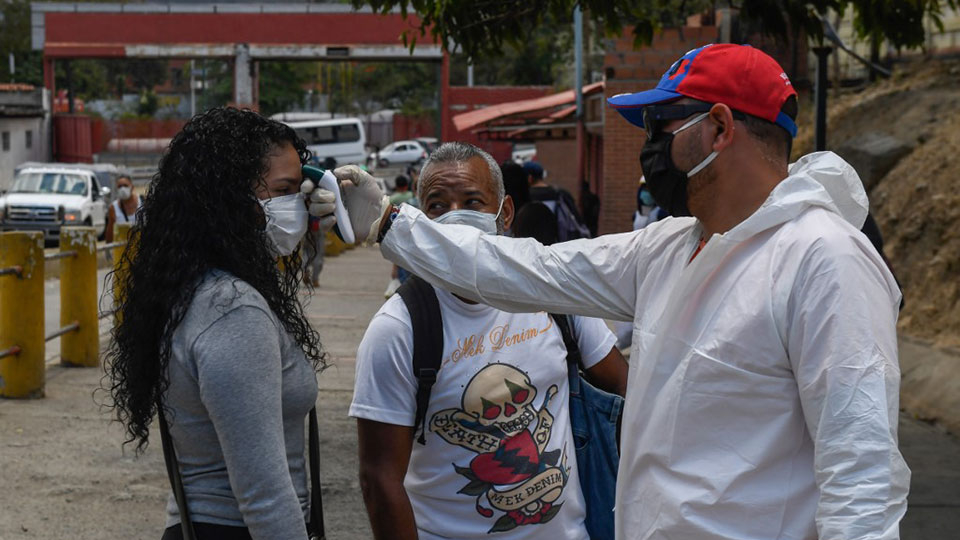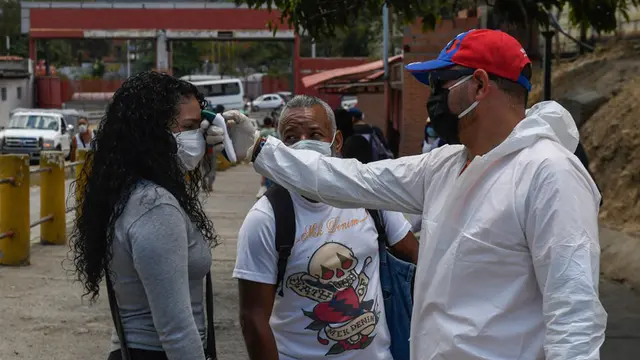
Testing for fever in Caracas on March 18, 2020. Federico Parra / AFP
Leaders acrossLatin America are taking stepsto try and prevent the coronavirus pandemic from spreading.
Venezuela'sPresident Nicolás Maduro announcedresidents ofhiscountry - severely weakened from years of economic and political strife - would be put under quarantine after the number of cases there rose significantly.
Meanwhile the International Monetary Fund has said it could not considerMaduro's request for $5 billion to deal with the pandemic because his government isn’t recognized by the international community.
Brazilis approaching 400coronavirus cases.PresidentJair Bolsonaro has been criticized for joining public rallieslastweekend just as hisSouth Americancounterparts were ordering citizens to stay at home to minimize the spread of the virus.
Many countries including Chile, Argentina, Ecuador, Peru and Colombia, which began by suspending flights from Europe and Asia, have now shut their borders.
They have all imposed quarantine measures for at least two weeks.
Ecuador's President Lenín Moreno said the police and army would enforce measures to restrict movement but people would be able to buy food, visit hospitals and care for the sick or elderly.
The country has seen its number of cases more than triple in three days from about three dozen on Mondayto 155 on Wednesday,including at least two deaths.
On Wednesday, Chile's leader Sebastián Piñera declared a"state of catastrophe" for three months in the whole country, which includes a quarantine and curfew, limiting movement and banning large gatherings in public spaces. All borders were closing on Wednesday, allowing only Chilean citizens to re-enter the country with an obligatory two-week quarantine.As of Wednesday, the country had close to 250confirmed cases.
Peru declared a national emergency on Sunday, imposing restrictions on movement and deploying the army and police to enforce a two-week quarantine for all citizens. Workers in some critical sectors such as health, finance and communication were allowed to commute. As of Wednesday there were 145 confirmed cases of the virus, the vast majority in the capital Lima, where about a third of the population lives. President Martín Vizcarra also announced a night-time curfew on Wednesday for the remainder of the quarantine period.
The national emergency also shut down the Andean country's principal tourist attraction Machu Picchu, where site administrators expect economiclosses of up to $100 million, leaving hundreds of tourists stuck inthe city ofCusco demanding refunds.
Argentina was among the first nations in the Latin America to close its borders after becomingthe first country in the region to announce a deathrelated to the virus on March 7. Asecond deathwas reported on March 13.At least79 caseshave been confirmed.
On Tuesday,President Iván Duque of Colombiadeclared a state of emergencyand announced that people aged 70 years and older were obliged to stay in their homes and isolate themselves. The government has reported at least93 cases.
Meanwhile in Uruguay, a nation of around 3.5 million people, one of the smallest populations of any country in the region, the health ministry confirmed50 cases by midweek. President Luis Lacalle Pou announced it would close its border with Argentina.
Over the last month after thefirst casewas reportedin Brazil, the health risksand economic impact have only grown. Prior to the pandemic, the IMF predicted 1.6% GDP for the region this year. That figure – combined with dropping oil prices and plummeting Latin American markets and currencies – looks bound to be revised down.
 简体中文
简体中文

